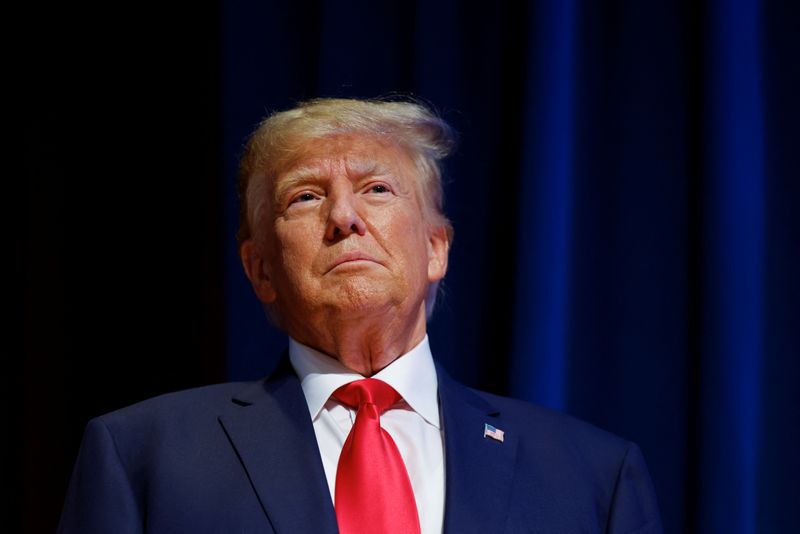By Tim Reid, Nathan Layne and Gram Slattery
(Reuters) -For decades U.S. Republicans have proudly claimed to be the party of law and order.
But the indictment of former President Donald Trump by federal prosecutors over the alleged mishandling of classified documents has led to nearly all of his Republican rivals for the party's White House nomination accusing the FBI of political bias, with some even calling for its dissolution.
The spectacle of so many Republican presidential candidates attacking America's top law enforcement agency while siding with Trump - the front-runner for the nomination - has left many observers dumbfounded, given the party's long tradition of being tough on crime and staunch defenders of federal and local cops.
This extraordinary reversal reveals a tension between Republicans' traditional support of law enforcement and the political calculation Trump's rivals are making as opinion polls show most Republicans think the former president is being unfairly targeted, analysts say.
The broad assault on the FBI by most of the Republican field has its roots in the years of political attacks by Trump against the agency. Trump has long accused it and the U.S. Justice Department of being out to get him.
"Trump's attacks on the FBI are so pervasive amongst Republican primary voters that his rivals can't say something different to Trump on that," said Kyle Kondik, a non-partisan analyst at the University of Virginia Center for Politics.
Trump intensified his attacks on the FBI after taking office, enraged by a federal investigation into alleged ties between his 2016 election campaign and Russia.
That probe did not find that Trump or his campaign coordinated with Russia to interfere in the 2016 election, but it laid out instances where Trump allegedly obstructed the investigation and stated that "while this report does not conclude that the President committed a crime, it also does not exonerate him."
Trump's repeated criticism had a major impact on public opinion. A Reuters/Ipsos poll conducted in February 2018, little over a year after he entered the White House, found that three out of four Republicans thought the FBI and Justice Department were actively seeking to undermine Trump through politically motivated investigations.
That anti-FBI sentiment was fueled by the agency's decision not to prosecute Trump's 2016 opponent, Democrat Hillary Clinton, for using a private email server when she was U.S. secretary of state. Then-FBI Director James Comey rebuked Clinton, calling her handling of classified information careless, but said there was no clear evidence she or her aides intentionally broke laws.
Trump has also been highlighting the issue of a laptop allegedly belonging to Hunter Biden, the son of Democratic President Joe Biden. Trump and his allies claim without basis that the laptop has evidence of corruption inside the Biden family and that the FBI has failed to prosecute that.
REPUBLICAN SUPPORT
More than 80% of Republicans say the new charges against Trump are politically motivated, according to a Reuters/Ipsos poll completed on Monday that shows Trump maintaining a commanding lead in the race for the Republican nomination.
That dynamic has left most of his rivals for the nomination calculating - in the short term at least - that attacking the FBI and the Justice Department is the safer option.
Most have called for the dismissal of FBI director Christopher Wray - a Republican appointee - and for reforming the agency, which they say has been "weaponized" by the Biden administration.
Biden has said repeatedly he has played no role in the classified documents case against Trump, while the Justice Department says it acts impartially.
Timothy Naftali, a presidential historian, said many Republican candidates have presented themselves as crime-busting, law and order types. But their decision to rebuke the Justice Department, and not Trump, over last week's charges "sets up a tension between those principles and their current reaction to the indictment," Naftali said.
Trump's closest rival for the nomination, Florida Governor Ron DeSantis, decried the "weaponization" of federal bureaucracy after Trump's indictment.
Within DeSantis' camp, advisers believe the campaign would have risked appearing opportunistic and out of touch with primary voters if they attacked Trump more directly over the documents charges, two people close to the governor said.
Where DeSantis does engage, those people said, it will likely be to question Trump's effectiveness at fighting the federal bureaucracy and the so-called "deep state."
Some candidates, including former New Jersey Governor Chris Christie, former Arkansas Governor Asa Hutchinson and former South Carolina Governor Nikki Haley have taken a more critical stand. Haley said Trump had acted recklessly, although she also said the FBI and Justice Department had "lost all credibility with the American people."
None of the Republican president campaigns responded to requests for comment about their criticism of federal law enforcement and calls for an overhaul.
Trump's campaign also did not respond to a request for comment.
A spokesman for the Justice Department, which oversees the FBI, declined to comment. The Republican National Committee did not respond to a request for comment.
Bill Bowen, 78, a retired food company executive who lives in Portsmouth, New Hampshire and voted for Trump twice, said Republicans see a two-tiered justice system that is harsh on their party's members while giving Democrats a pass.

"The whole justice system has been tilted very, very heavily against Trump," he said.
But that will not be enough to persuade Bowen to vote for Trump again. After the Jan. 6 attacks by Trump supporters on the U.S. Capitol, he broke with the former president.